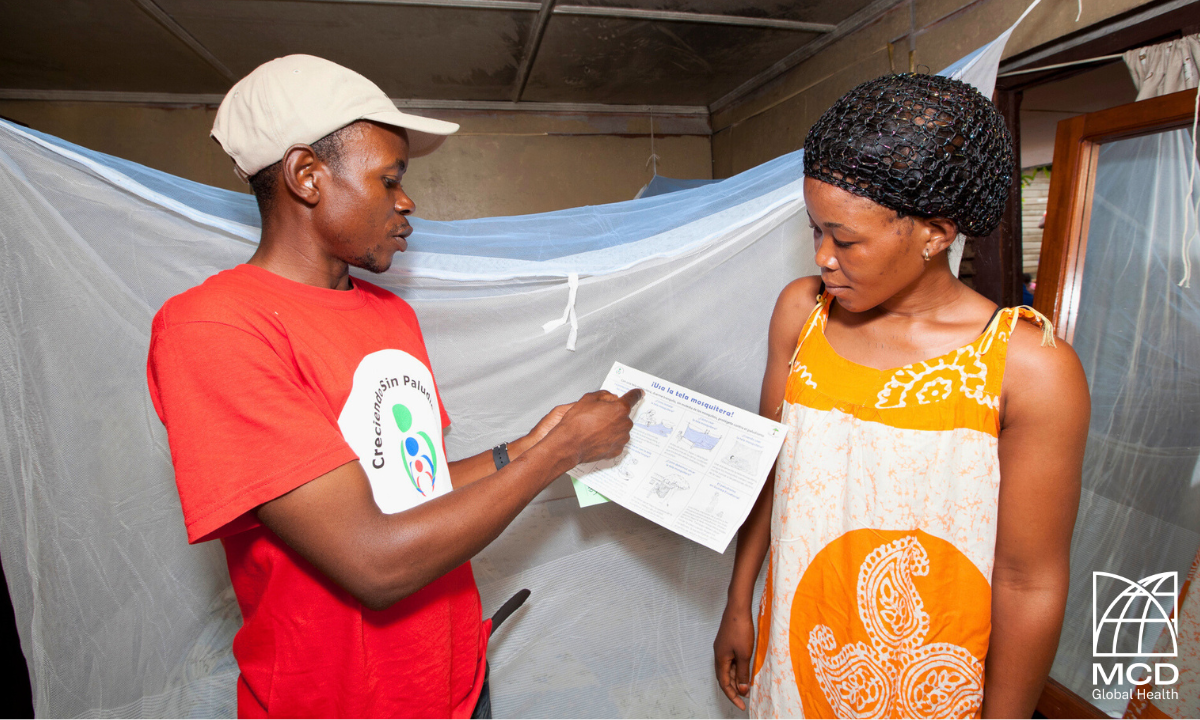
Advancing Malaria Elimination: Insights from Our Latest Research
December 3, 2024

Bioko Island Malaria Elimination Project staff member helping a resident set up a long-lasting insecticidal bed net.
Recent research published by MCD Global Health’s Bioko Island Malaria Elimination Project (BIMEP) team on Bioko Island, Equatorial Guinea, in several well-known journals has uncovered pivotal strategies that could significantly advance global elimination efforts.
Below are five key insights:
1. Enhanced Surveillance and Data Utilization
Imagine a world where every malaria case is tracked in real-time, allowing health officials to swiftly identify and respond to outbreaks. Our studies emphasize the transformative power of advanced surveillance systems. By integrating cutting-edge technology, we can pinpoint malaria hot spots and allocate resources more efficiently, ensuring that no case goes unnoticed.
2. Improving Treatment Adherence
On Bioko Island our team uncovered a critical challenge: treatment adherence. Despite the availability of effective antimalarial drugs, many individuals fail to complete their treatment regimens. Our findings in Malaria Journal reveal the gap between reported and actual adherence rates. Addressing this issue through targeted interventions is essential to ensure that every patient completes their treatment, reducing the risk of drug resistance and relapse.
3. Innovative Vector-control Strategies
Our article in the International Journal of Infectious Diseases explores groundbreaking vector control methods, including genetically modified mosquitoes and novel insecticides. These innovative approaches complement existing strategies and overcome the growing challenge of insecticide resistance. By adapting to changing mosquito behavior, we can reduce malaria transmission.
4. Addressing Imported Malaria Cases
COVID-19 has shown that travel restrictions can impact disease transmission. Our study in Nature Communications highlights how the travel moratorium on Bioko Island led to a significant reduction in malaria prevalence, indicating a need for more robust and adaptable strategies in controlling and preventing imported malaria cases. By preventing the introduction of new cases, we can protect local populations and sustain elimination efforts.
5. Optimizing Long-lasting Insecticidal Nets Distribution
Our latest research, published in the Malaria Journal, addresses the challenge of improving long-lasting insecticidal net (LLIN) coverage on Bioko Island. Despite significant resources, achieving and maintaining high coverage has been elusive. By using data to adapt distribution strategies, particularly shifting from mass distribution campaigns to fixed distribution points in urban areas like Malabo, we observed a significant improvement in net-use rates. This approach ensures that those who receive nets are more likely to use them, enhancing the overall effectiveness of vector control efforts.
These insights show the importance of a multifaceted approach in preventing malaria. By enhancing surveillance, improving treatment adherence, adapting vector control strategies, managing imported cases, and optimizing LLIN distribution, we can move closer to a malaria-free world.